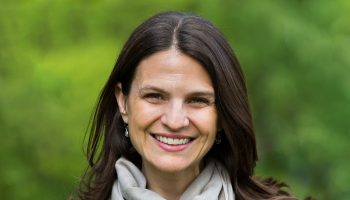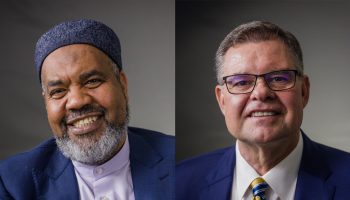Reporters on any beat are going to write about death in a COVID-19 world, Columbia Journalism School’s Ari Goldman said, and he teaches his students how to do just that. Goldman said in a Dart Center for Journalism and Trauma webinar that understanding how to handle the subject matter of dying, and religious practices tied to it, is more important than ever.

“Today, everyone is an obituary writer,” Goldman told his students. “Whether you cover fashion or business or the arts, you’re going to have to write an obituary.”
Goldman’s lecture, “From Church Stories to Obituaries, Journalists Need Religious Literacy,” will air at 2 p.m. EDT Thursday, Aug. 6, on the CHQ Assembly Video Platform as part of the Week Six Interfaith Lecture Series theme, “Lessons in the School House.” Audience members can submit questions through the www.questions.chq.org portal or on Twitter with #CHQ2020.
After 20 years of bylines in The New York Times, where he covered religious topics and obituaries along with New York City news beats, Goldman is the director of Religion, Journalism, and the Spiritual Life for Columbia University’s Scripps Howard Program. But he still writes for major news outlets including The New York Times, Salon, The New York Jewish Week, and the Forward.
He most recently wrote an opinion piece in The Washington Post calling for everyone, self-described writers and non-writers alike, to keep a journal. He keeps a pen and a blue notebook by his bed.
“Sometimes, it is just ‘I took a shower’ or ‘S and I played Scrabble’ or ‘Tuna, again,’” Goldman wrote. “Other times, I note the markers of this strange journey. ‘Stopped walking in Riverside Park’ or ‘Trump says we’ll be out by Easter’ or ‘started wearing a mask outside’ or ‘played duets with J’ or ‘Fauci says November’ or simply ‘prayed.’”
Before COVID-19, he led study abroad trips where Columbia students have covered religion in India, Russia, Ukraine, Ireland, Italy, Jordan, the West Bank and most recently Israel in spring 2019. But last semester, his students covered religious responses to COVID-19 across Christianity, Sikhism, Islam, Judaism, Native American faith practices, and Vodou.
In the Dart seminar, which took place in April, Goldman said there is a distinction between obituaries and news stories steeped in COVID-19 deaths. Obituaries, while still requiring reporting, handle details with a layer of sensitivity.
“Obituaries are not about death,” he said in the seminar. “You’re writing about life. One little fact in it is that this person passed away. If it’s about death, then this is a news story.”
This program is made possible by the Elizabeth Elser Doolittle Endowment Fund for Adult Programming.




